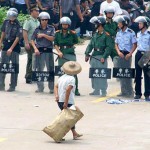Is China Heading for a Rural Revolt?

Click here to read all of David Frum’s blogposts from China.
'The world's factory floor," an American resident of China announced, pointing out the car window to a vast industrial landscape in south China. Between Shenzhen and Guangdong, here are made the routine goods of the modern economy. Here pour the children of China's poorer peasants. The dormitories may be crowded, the air filthy, the water unsafe, but the money is good. A capable worker can earn $1 an hour at a factory bench or on the construction site, maybe three times as much as can be gained from peasant labor on China's farms.
But there remain still maybe 700 million people on those farms. They are poorer than city people. They are taxed more heavily. They are more vulnerable to the whims of local power-holders. Their environment is just as polluted in its way as the urban environment, but without the schools and hospitals available to urban Chinese. The thrilling new world of television, telephone and Internet is closed to them.
Nor is it easy for them to move. The Chinese government regulates the right of urban residency. Only legal city residents may use city schools, hospitals or other facilities. These rules are fiercely enforced by budget-conscious local governments. A peasant who moves to the city without permission enters a much harsher world than a Mexican national who illegally migrates to the United States.
People who study these things believe that Chinese agriculture made rapid progress in the 1970s and 1980s, but that it has now stalled. While city-dwellers earn maybe twice as much as they did a decade ago, farmers earn about the same. The Chinese have bumped against the limits of what peasants can achieve working small farms with their bare hands.
Consider China's most important livestock industry: pork. Back in 1980, before economic takeoff, the average Chinese pig weighed 71 kg. at slaughter. Thirty years later, the average pig is not much bigger, only 75 kg. By comparison, Danish pigs, the world's quality leaders, typically weigh 90 kg. at slaughter. Why can't China raise bigger pigs? Heavier pigs have to be housed in sturdier barns, moved over stronger planks and trucked in bigger vehicles. Bigger pigs have to be fed longer, their turnaround time is slower. Chinese farmers will not or cannot make the required investment. Instead, they are trying to meet consumer demand by raising more pigs: about 500 million today up from 300 million in 1980. Multiplying the number of pigs demands more labor. Farmers earn more money, but not more money per hour.
To raise rural living standards higher, Chinese agriculture will have to mechanize and modernize, substituting machines for people and merging little plots into larger fields.
Think of what happened to southern sharecroppers between 1900 and 1950. Now multiply by about 70 times as many people. That's China's next revolution. If China's urban economy continues to grow at 9%, 10% and 11% a year, it can maybe employ those displaced rural people. But what if the migration from countryside to city accelerates? What if the rate of urban growth slows?
Visitors to China spend most of their time in the cities. We talk to educated people unhappy about the regime's censorship of Facebook and YouTube. We worry about pollution of the air and water. But we never meet anybody who is angry. We never meet anybody angry enough to do violence. Yet China has never had any shortage of such people: Angry peasants brought down imperial China in a series of rural uprisings stretching from the 1850s to the 1950s. And if growth here ever falters, there will be many more angry people again.
Brutal Communist repression kept the Chinese countryside quiet in the 30 years after 1950. Zooming prosperity has quieted the countryside since 1980. But the repression has subsided -- and the growth of prosperity in the countryside may be faltering. What then? Will rural discontent spark China's next revolution?
Originally posted in the National Post.